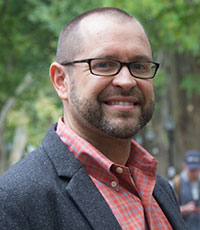With government funding for charitable organizations constantly being in flux, the fear of dissolving is a reality many government-dependent organizations must face. In this current climate, will executive leaders make the challenging decision of merging? Will more organizations start partnering? We sat down with Jason Miller, CEO of Families Forward Philadelphia (FFP), a family homeless shelter, to glean insight into his expertise on partnerships and his hopes for securing a long life for FFP.
Q: Does Families Forward Philadelphia have any current partnerships?
A: Great question. I think we have a lot of relationships with foundations and nonprofit organizations like William Penn and United Way, to name a few. If you think about it, we have been around long enough that even if we are not receiving funding from any particular organization, we’ve been there...we’re known. We’re a part of the Family Service Provider (FSP) network which is a group of 20 family providers in the City, comprised of organizations like People’s Emergency Center, PHMC, and Salvation Army. Then, right around us are two main groups -- Children’s Hospital of Philadelphia (CHOP) Karabots Pediatric Care Center and Enterprise Center. Karabots is an outpatient practice arm of CHOP. Tens of thousands of kids go there for services. We partnered with them on a William Penn grant that focuses on youth literacy. The program supports families in engaging in literacy-building activities and ensures that every community in Philadelphia has access to literacy-rich programming. Our participants at FFP are their main source of clients. We were intentional about developing this relationship because they are right beside us.
The second group is the Enterprise Center, which is also just a few blocks away. They’re huge into workforce development. What ends up happening is that organizations like Enterprise and CHOP come to us saying “we want to try something new.” For example, Enterprise may want to hire a couple of our participants and give them a small stipend so they can learn how to farm the garden at CHOP. People are at the family homeless shelter for an average of six to seven months. They need to know that when they leave here, they still have access to those gardens and that if they want to start a small business they can go to Enterprise. It’s not hard to make these relationships. You just have to do it -- and people need to trust your leadership.
Q: When you think about sustaining the organization long-term, do you have any mergers and/or partnerships in mind?
A: I’m not at the point where I want to think about merging with anyone else because I don’t know who would be most appropriate. It’s currently outlined in our strategic plan that FFP will take over another organization but, based on how we’re organized, that’s a big lift.
Usually, it seems like family homelessness is invisible. Some people know FFP is there and some people don’t. We have to shout so that people are paying attention to us. For example, there’s a group right beside us, Community College of Philadelphia (CCP), that we haven’t tapped into [for a partnership] yet. Similar to our partnership with CHOP, the goal is to build relationships with entities within the community. We need to expose our participants to what’s in the community.
Q: What is the intended social impact of FFP’s partnerships?
A: To be completely transparent, I have to be aware of the fact that I’m a White guy. Whenever I’m at any “table,” the next step is to ask myself, “how do I make sure I’m using the privileges given to me for the organization and for the participants?” -- so that someday they are the ones at the table, they are the ones with the voice, and they are the ones with the power. That’s the whole point of partnering.
Author bios
Ashley Franks is a Master in Law ('19) and Master of Social Work ('19) graduate from the University of Pennsylvania. She was named recipient of the esteemed 2017-2019 Otto and Gertrude Pollak Scholarship: a full-tuition scholarship awarded to a single MSW student based on exceptional academic performance, service to the community, and professional experience. Ashley is currently a Quality Review Specialist at the Drueding Center within the Holy Redeemer Health System where she enhances service provision through data, quality review, and compliance.
Gerolly Lorenzo holds a Master of Social Work from the University of Pennsylvania. She is currently the Service Year Expansion Manager at the Mayor's Office of Civic Engagement and Volunteer Service where she supports strategic initiatives to expand national service programs in the City of Philadelphia.



